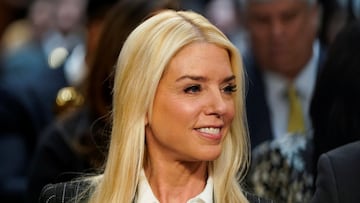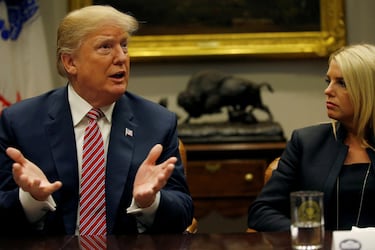This is Attorney General nominee Pam Bondi’s record attacking the Affordable Care Act
Pam Bondi has been a loyal supporter of Donald Trump and his policy goals. How this former-Democrat ended up in Trump world.


Former Florida Congressman Matt Gaetz stepped aside from the nomination process for US Attorney General, after meeting with Republican Senators who informed him that his confirmation could create a spectacle that would reflect poorly on the incoming Trump administration. On Jan. 15, 2025 Bondi will face her confirmation hearing before being nominated as Trump’s Attorney General.
President-elect Trump and his transition team were quick to announce that Pam Bondi, Florida’s former Attorney General, would replace Gaetz. Bondi, though a Trump loyalist like Gaetz, has stronger credentials and a cleaner record, making her confirmation process likely to run much more smoothly. Her professional qualifications make her nomination more palatable to factions within the Republican Party who were concerned about how supporting Gaetz could damage their reputation.

Bondi’s entrance into Trump world
Bondi served as Attorney General of Florida from 2011 to 2019, and during the first Trump administration, she was part of the legal team that represented him during his impeachment proceedings in Congress.
A Tampa native, Bondi attended the University of Florida, where she graduated with a degree in criminal justice in 1987. She then continued her studies at Stetson University College of Law, earning her Juris Doctor in 1990. A year later, she passed the bar and began working as a prosecutor in Hillsborough County. She remained an Assistant State Attorney until she launched her campaign for Attorney General of Florida in 2010.
The 2010 Republican primary was competitive, but by employing strategies later adopted by Donald Trump—such as leveraging media power with appearances on Fox News—she secured a victory.
It is very important to the President-elect to have a person leading the Department of Justice who is loyal to him.
Bondi showed her commitment to the President-elect throughout his administration. In addition to representing him during his Senate impeachment, she claimed during the 2020 election that large-scale voter fraud operations were being carried out in the swing states of Georgia, Pennsylvania, and Wisconsin. When asked on Fox News to provide evidence of these crimes, she failed to do so. In her response, she claimed that illegally cast ballots, including some with the names of dead people, were being counted. All of these claims have been investigated, and no charges have ever been brought forward. Nevertheless, it could be that, with Bondi as the head law enforcement officer of the United States, they could once again be opened.
Bondi’s efforts to repeal the Affordable Care Act
Healthcare prices have increased rapidly since the passage of the Affordable Care Act. The America First Policy Institute, with which Bondi is affiliated, places the blame squarely on the Democrats. In one policy brief, they highlight how healthcare premiums have increased by 80 percent since 2010. This is true. However, the fact sheets neglect to mention that between 2000 and 2010, health insurance premiums increased by 86 percent. In other words, the crisis in the American healthcare system—which has led to a situation where those with insurance can’t afford to use it and thus put off visits to the doctor at the risk of their own health—has been brewing for decades.
The Affordable Care Act handed a lot of power to private insurance companies, and through a collection of subsidies and new rules, twenty million more people have health insurance today than before the ACA was passed. While that additional coverage may save households money, it has led the U.S. to pay more than double what many other developed economies pay on a per-capita basis. Without a single market for healthcare, where the government negotiates prices with service providers, the U.S. public is divided into several insurance pools led by private companies and organizations that seek to cut costs, often at the expense of coverage.
In rural areas, healthcare can be difficult to access, and quality can vary. In 2018, Pew Research conducted a survey that found nearly a quarter of respondents living in rural areas said that “access to good doctors and hospitals is a major problem in their community.”
Healthcare reform is needed in the United States, but attacking regulation, as many Republicans do, neglects protections afforded by some of that red tape. Before the ACA was passed, insurance companies could sell junk plans that did not cover maternity care, prescription drug costs, and other essential healthcare services that many people purchase insurance to obtain. Insurance companies could also discriminate against people with preexisting conditions.
In 2018, in her capacity as Florida Attorney General, she signed onto a lawsuit brought to the Supreme Court by over a dozen Republican-led states to overturn the ACA. The group was only partially successful, as protections for those with preexisting conditions and the general framework were allowed to remain, but the court ruled that the individual mandate was unconstitutional. The mandate had fined taxpayers who failed to purchase insurance, which was designed to encourage healthy young people into the market.
Healthcare pools need to be large to reduce costs. If the only people who purchase insurance are sick, it will be very costly. In countries with nationalized healthcare systems, these issues are not as pervasive, as all citizens and residents are enrolled, creating a balance. Younger people typically visit the doctor less, but as they age and require more medical attention, they have paid over the course of many years, providing a stable base to fund care when needed.
Related stories
Before the ACA was passed, millions of people were not allowed to purchase insurance because they had a preexisting condition. This grossly immoral practice helped keep costs down by excluding those most in need of health insurance from the market.
During the first Trump administration, Congress attempted to repeal the ACA but failed. The President-elect did not make repealing it a central point of his most recent campaign, and when famously asked if he had a plan for healthcare, he responded that he had “concepts of a plan.” Often, Republicans advocate for less regulation in insurance markets to bring prices down, but assuming that the rules governing these markets are all red tape to be cut neglects the protections that millions are afforded by these rules. Lower costs in the healthcare market are needed, but if they come at the expense of coverage, then the number of individuals who benefit from those price reductions also shrinks.


Complete your personal details to comment